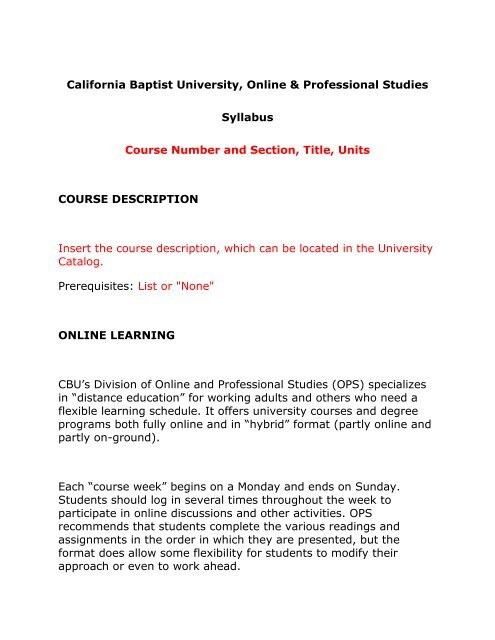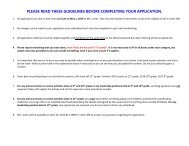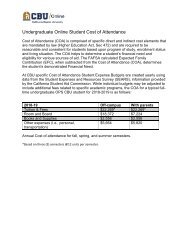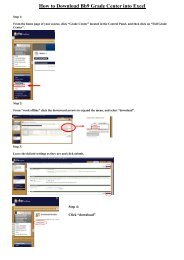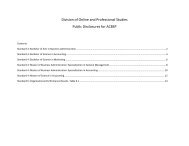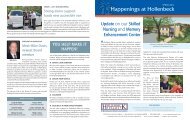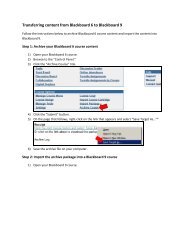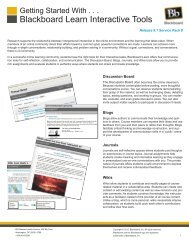Cbu Online and Professional Studies Syllabus
CBU’s Division of Online and Professional Studies (OPS) specializes in “distance education” for working adults and others who need a flexible learning schedule.
CBU’s Division of Online and Professional Studies (OPS) specializes in “distance education” for working adults and others who need a flexible learning schedule.
You also want an ePaper? Increase the reach of your titles
YUMPU automatically turns print PDFs into web optimized ePapers that Google loves.
California Baptist University, <strong>Online</strong> & <strong>Professional</strong> <strong>Studies</strong><br />
<strong>Syllabus</strong><br />
Course Number <strong>and</strong> Section, Title, Units<br />
COURSE DESCRIPTION<br />
Insert the course description, which can be located in the University<br />
Catalog.<br />
Prerequisites: List or "None"<br />
ONLINE LEARNING<br />
CBU’s Division of <strong>Online</strong> <strong>and</strong> <strong>Professional</strong> <strong>Studies</strong> (OPS) specializes<br />
in “distance education” for working adults <strong>and</strong> others who need a<br />
flexible learning schedule. It offers university courses <strong>and</strong> degree<br />
programs both fully online <strong>and</strong> in “hybrid” format (partly online <strong>and</strong><br />
partly on-ground).<br />
Each “course week” begins on a Monday <strong>and</strong> ends on Sunday.<br />
Students should log in several times throughout the week to<br />
participate in online discussions <strong>and</strong> other activities. OPS<br />
recommends that students complete the various readings <strong>and</strong><br />
assignments in the order in which they are presented, but the<br />
format does allow some flexibility for students to modify their<br />
approach or even to work ahead.
Active participation in every assignment <strong>and</strong> every online discussion<br />
is expected. Students should be careful of any assignments that<br />
have specific “opening” or “closing” times, <strong>and</strong> they should regularly<br />
consult the Course Schedule to ensure that they complete all work<br />
in a timely manner.<br />
Students access all course materials via the Blackboard 9 site,<br />
which includes minimum system requirements <strong>and</strong> orientation<br />
tutorials designed to equip class members for online study. These<br />
items can be found in the "technology help" folder located through<br />
the "student resources" link on the Blackboard course menu.<br />
INSTRUCTOR CONTACT INFORMATION<br />
Insert your information below, then change the text to black, <strong>and</strong><br />
delete these instructions.<br />
1. Name<br />
2. Office location<br />
3. Phone<br />
4. Email<br />
5. Office hours<br />
REQUIRED TEXTS & RESOURCES<br />
The Campus Store provides textbook services for those students<br />
seeking to make an on-campus purchase <strong>and</strong>/or to utilize book<br />
vouchers. For students choosing to purchase their books online,<br />
click here to order book(s) from Amazon. Certain books may only be<br />
available through the publisher or other alternatives as noted below.
Insert:<br />
1. Required texts, including APA formatted references <strong>and</strong> ISBN<br />
numbers.<br />
2. Links to web-related resources (check for accuracy).<br />
Also add any additional information regarding required resources<br />
such as videos, lab kits, etc.<br />
COURSE STUDENT OUTCOMES<br />
Insert course objectives here. This should be a simple copy/paste of<br />
the identical table from the Course Design Worksheet.<br />
Course Objectives SLO* USO**<br />
Objective 1: Students will demonstrate a<br />
fundamental underst<strong>and</strong>ing of leadership theories <strong>and</strong><br />
practices with special emphasis given to their<br />
adaptation <strong>and</strong> application to the real world (sample).<br />
Students will be able to:<br />
Objective 1.1: identify fundamental<br />
leadership theories (sample).<br />
Objective 1.2:<br />
Objective 1.3:<br />
Objective 2:<br />
Students will be able to:<br />
Objective 2.1:<br />
Objective 2.2:<br />
Objective 2.3:<br />
Objective 3:<br />
Students will be able to:<br />
Objective 3.1:<br />
1.1, 1.2<br />
(sample)<br />
APa<br />
(sample)
Objective 3.2:<br />
Objective 3.3:<br />
Objective 4:<br />
Students will be able to:<br />
Objective 4.1:<br />
Objective 4.2:<br />
Objective 5:<br />
Students will be able to:<br />
Objective 5.1:<br />
Objective 5.2:<br />
Objective 5.3:<br />
*Student Learning Outcomes; **University Student Outcomes –<br />
Academically Prepared: Critical Thinking for Literacy (APa);<br />
Academically Prepared: Math, Science, Tech. (APb); Biblically<br />
Rooted (BR); Globally Minded (GM); Equipped to Serve: Profession,<br />
Workplace (ESa); Equipped to Serve: Social Ethics, Community<br />
Involvement (ESb)<br />
ASSIGNMENTS OVERVIEW<br />
Please add a one-paragraph description for each assignment. After<br />
each assignment, in parenthesis, add the CSO(s) being addressed.<br />
Please note the Critical Assignment <strong>and</strong> add the following to its<br />
overview - This is the Critical Assignment for this course <strong>and</strong> must<br />
be passed at an acceptable rate in order to pass the course.<br />
* All work submitted for this course must be your own work, must<br />
have been developed specifically for this course, <strong>and</strong> may not have<br />
been submitted for evaluation or assessment in any other course.<br />
The Critical Assignment must be passed at an acceptable rate in<br />
order to pass the course.
ASSESSMENT POLICIES<br />
Course Evaluation Plan<br />
An assessment instrument (checklist, rubric, etc.) will accompany<br />
each major graded assignment. See the course website for specific<br />
assignment criteria <strong>and</strong> the accompanying grading instruments<br />
Points Distribution<br />
Graded assignments will be weighted as follows:<br />
Graded Assignments<br />
Points Possible<br />
Learning Activity #1 20<br />
Learning Activity #2 40<br />
Learning Activity #3 100<br />
Etc.<br />
Final Grades<br />
Total Points: 1000<br />
The following scale will be used when calculating final grades:<br />
A 93%-100% B- 80%-82% D+ 67%-69%<br />
A- 90%-92% C+ 77%-79% D 63%-66%
B+ 87%-89% C 73%-76% D- 60%-62%<br />
B 83%-86% C- 70%-72% F
Week<br />
2<br />
Learning Activity #3 Week 2, Day<br />
1<br />
Learning Activity #4<br />
Week 2, Day<br />
3<br />
Learning Activity #5<br />
Week 2, Day<br />
5<br />
Etc.<br />
Week<br />
3<br />
Week<br />
4<br />
Week<br />
5<br />
Week<br />
6<br />
Week<br />
7<br />
Week<br />
8
* The course schedule, located in the syllabus, always dictates the<br />
due date for a particular activity or assignment.<br />
EXPECTATIONS<br />
<strong>Professional</strong>ism<br />
All written work must be of professional quality. All written work<br />
must be keyed using a computer. H<strong>and</strong>written work will not be<br />
accepted. In addition, work that has excessive (more than 2 per<br />
page) or distracting grammatical, mechanical, or typographical<br />
errors will be graded accordingly. All written assignments should be<br />
written using the APA style format.<br />
As a professional, you are expected to collaborate with your<br />
colleagues during in-class activities or out-of-class group projects,<br />
<strong>and</strong> to respect one another with exemplary listening skills during all<br />
interactions, presentations, <strong>and</strong> class discussions. This also requires<br />
supporting your classmates with positive body language <strong>and</strong><br />
appropriate verbal communication.<br />
Regular Effective Contact<br />
Students <strong>and</strong> instructors will, at a minimum, adhere to the<br />
following:<br />
<br />
<br />
<br />
LancerMail should be used for all email communication <strong>and</strong><br />
checked on a daily basis.<br />
Timely feedback for communication is 24 hours* <strong>and</strong> may be<br />
h<strong>and</strong>led by email, phone, or in person.<br />
Timely feedback for assessed work is 72 hours* for minor<br />
assignments (section tests, smaller papers/projects) <strong>and</strong> 1<br />
week* for major assignments (midterm, final, major<br />
project/paper).<br />
* After submission deadline <strong>and</strong>/or excluding weekends
Late Assignments<br />
Insert your policy regarding late assignments.<br />
(In determining the penalty for assignments submitted beyond the<br />
due date, OPS faculty may use reasonable discretion based on the<br />
nature of the assignment <strong>and</strong> the circumstances. The bottom line<br />
is that a clearly articulated late assignment policy must be<br />
present.)<br />
*Late work will not be accepted after the course end date.<br />
Netiquette<br />
"Netiquette" can be described as a set of guidelines that govern the<br />
behavior of Internet users. These guidelines are a collection of best<br />
practices that promote professionalism, respect, safety <strong>and</strong> good<br />
digital citizenship.<br />
A summary of Netiquette guidelines has been created based on<br />
published sources such as Virginia Shea's online book, Netiquette<br />
(2004). The summary can be accessed via the following Web link:<br />
https://bb1.cbuonline.edu/netiquette_rules_of_behavior_allyn_baco<br />
n.pdf<br />
All students are expected to follow Netiquette guidelines when<br />
communicating electronically with classmates <strong>and</strong> instructors.<br />
Academic Honesty<br />
All violations of the Honor Code must be reported to the Student<br />
Services Office. A first incident of violation of the Honor Code<br />
is h<strong>and</strong>led at the discretion of the professor, in consultation<br />
with the Director of Student Conduct. Judicial sanctions for an<br />
offense are h<strong>and</strong>led on a case-by-case basis depending on the<br />
seriousness of the violation, prior violations, <strong>and</strong> other factors.<br />
Judicial sanctions may include, but are not limited to, loss of a letter<br />
grade, failure of the respective assignment/examination, or failure<br />
in the course in which the offense occurred, suspension, <strong>and</strong>/or<br />
expulsion from the University. A detailed discussion of academic
dishonesty appears in the CBU Student H<strong>and</strong>book.<br />
Students with Disabilities<br />
Students who have a documented disability <strong>and</strong> wish to arrange the<br />
appropriate accommodation must contact the Coordinator of<br />
Disability Services at DSS@calbaptist.edu.<br />
SUGGESTED RESOURCES FOR FURTHER STUDY<br />
Insert suggested resources for further study here. This should be a<br />
formatted reference list written in the appropriate style (APA, MLA,<br />
etc.).


